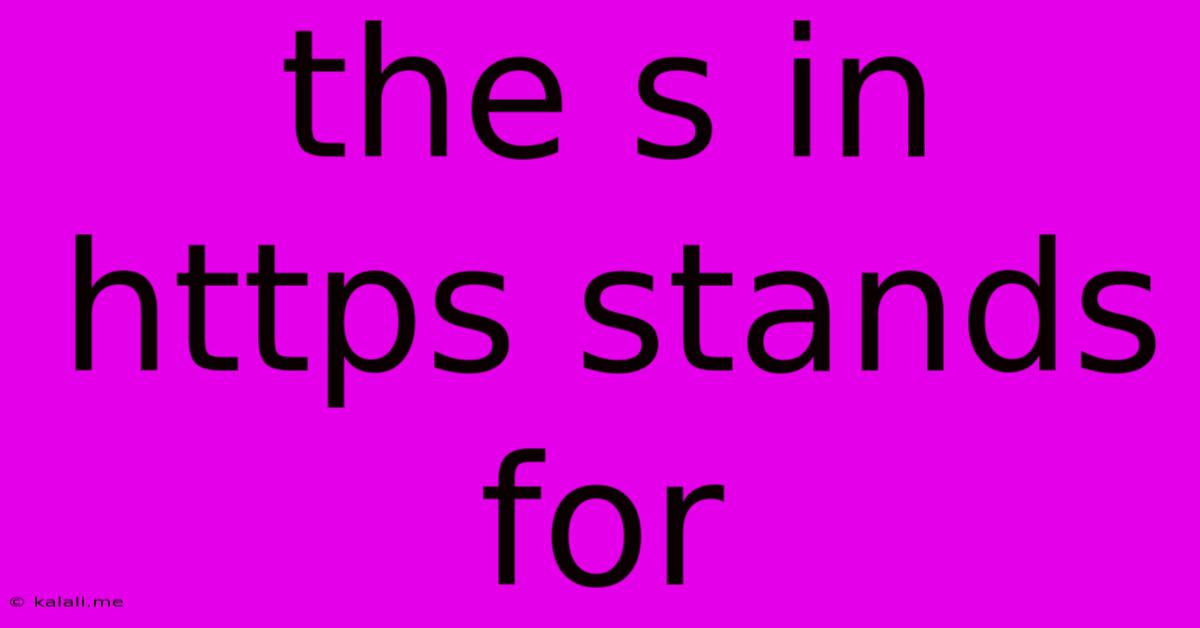The S In Https Stands For
Kalali
Jun 12, 2025 · 3 min read

Table of Contents
The S in HTTPS Stands For: Secure, and Why It Matters
The seemingly small "S" in HTTPS makes a world of difference online. This seemingly insignificant addition to the familiar HTTP protocol signifies a critical security upgrade, protecting your data and ensuring a safer browsing experience. In short, the S in HTTPS stands for Secure. But let's delve deeper into what that actually means and why it's crucial for both users and website owners.
This article will explore the significance of HTTPS, explaining how it works and why you should always prioritize websites using this secure protocol. We'll uncover the technical underpinnings and the practical implications of browsing with and without this crucial security feature.
What Does HTTPS Actually Do?
HTTPS, or Hypertext Transfer Protocol Secure, uses SSL/TLS (Secure Sockets Layer/Transport Layer Security) to encrypt the communication between your web browser and the website you're visiting. Think of it like sending a letter in a sealed envelope – only the intended recipient can read the contents. Without HTTPS (using HTTP), your data is transmitted in plain text, making it vulnerable to interception by malicious actors.
Here's a breakdown of the key security benefits:
- Data Encryption: HTTPS scrambles your sensitive information, such as passwords, credit card details, and personal data, making it unreadable to anyone eavesdropping on your connection.
- Authentication: HTTPS verifies the identity of the website you're visiting, ensuring you're not interacting with an imposter site designed to steal your information (phishing). This is achieved through SSL/TLS certificates issued by trusted Certificate Authorities (CAs).
- Data Integrity: HTTPS ensures that the data transmitted between your browser and the website remains unaltered during transit, preventing tampering or manipulation.
Why is HTTPS Important for Users?
The implications of using HTTPS are significant for everyday internet users:
- Protection Against Phishing: HTTPS helps prevent phishing attacks, where malicious websites mimic legitimate ones to steal your login credentials or other sensitive data.
- Secure Online Transactions: When making online purchases or banking, HTTPS is essential to protect your financial information from theft.
- Privacy Protection: HTTPS protects your personal data from being intercepted and misused by third parties.
Why is HTTPS Important for Website Owners?
For website owners, implementing HTTPS offers several crucial advantages:
- Improved Search Engine Ranking: Google and other search engines prioritize websites using HTTPS, giving them a boost in search results. This translates to increased visibility and organic traffic.
- Enhanced User Trust: Displaying the padlock icon and "https://" in the address bar builds trust with visitors, encouraging them to interact and engage with your website.
- Protection Against Data Breaches: HTTPS helps protect your website and your users' data from cyberattacks, reducing the risk of costly data breaches and reputational damage.
- Compliance with Regulations: Many industries have regulations requiring the use of HTTPS for data security and privacy, such as PCI DSS for payment processing.
In Conclusion: The "S" Makes All the Difference
The simple "S" in HTTPS represents a significant leap in online security. It's no longer optional; it's a necessity for both users and website owners alike. Prioritizing HTTPS ensures a safer, more secure, and more trustworthy online experience for everyone. Remember to always look for that "S" before entering any sensitive information online.
Latest Posts
Latest Posts
-
Which Of The Following Is A Component Of Effective Education
Jun 13, 2025
-
Diagram Of 2 Stroke Diesel Engine
Jun 13, 2025
-
The First Psychology Laboratory Was Founded By
Jun 13, 2025
-
How Many Players Are In A Basketball Game
Jun 13, 2025
-
Which Of The Following Is An Example Of Oxidation
Jun 13, 2025
Related Post
Thank you for visiting our website which covers about The S In Https Stands For . We hope the information provided has been useful to you. Feel free to contact us if you have any questions or need further assistance. See you next time and don't miss to bookmark.